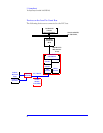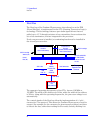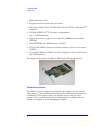
65
2 System Board
Host Bus
accept another request. The MCH, as target device, then requests the bus
again when it is ready to respond, and sends the requested data packet. Up
to eight transactions are allowed to be outstanding at any given time.
Intel Pentium III Processor
The Pentium III processor has several features that enhance performance:
• Dual Independent Bus architecture, (supporting level cache sizes of
i256 KB) plus a 64-bit system bus that enables multiple simultaneous
transactions (refer to “split -transaction” above).
• MMX2 technology, which gives higher performance for media,
communications and 3D applications.
• Dynamic execution to speed up software performance.
• Internet Streaming SIMD Extensions for enhanced floating point and 3D
application performance.
• Processor Serial Number is an electronic number incorporated in the
processor. If enabled, the Processor Serial Number can serve as a means
of identifying the system. By default, this option is set to Disabled in the
Setup program.
• Uses multiple low-power states, such as AutoHALT, Stop-Grant, Sleep and
Deep Sleep to conserve power during idle times.
The Pentium III processor is packaged in a self-contained Single Edge
Contact Cartridge (SECC-2) installed in a Slot 1 processor slot. The SECC-2
cartridge requires a 242-contact Slot 1 connector on the system board. It
includes a processor core chip and GTL+ termination resistors.
There are two Slot 1 processor slots, along with one VRM (Voltage
Regulation Module) socket. A single Pentium III processor for Slot 1 is
powered through an onboard voltage regulator.
Optional Second Processor
Single processor models can be upgraded to a dual processor system by
installing a second processor in the vacant slot. The second processor must
be a Pentium III processor for Slot 1 of the same speed as the first. The VRM
supplied with the processor accessory kit is installed in the vacant VRM slot.
The second processor is powered through the VRM.


















